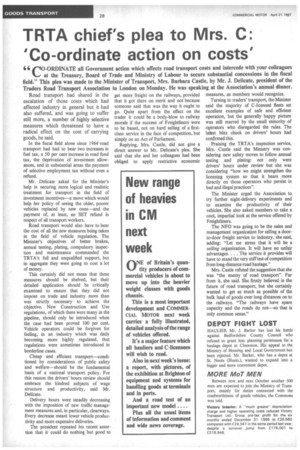TRTA chief's plea to Mrs. C: 'Co-ordinate action on costs'
Page 30

If you've noticed an error in this article please click here to report it so we can fix it.
66 CO-ORDINATE all Government action which affects road transport costs and intercede with your colleagues at the Treasury, Board of Trade and Ministry of Labour to secure substantial concessions in the fiscal field." This plea was made to the Minister of Transport, Mrs. Barbara Castle, by Mr. J. Delicate, president of the Traders Road Transport Association in London on Monday. He was speaking at the Association's annual dinner.
Road transport had shared in the escalation of those costs which had affected industry in general but it had also suffered, and was going to suffer still more, a number of highly selective measures which threatened to have a radical effect on the cost of carrying goods, he said.
In the fiscal field alone since 1964 road transport had had to bear two increases in fuel tax, a 50 per cent increase in road fund tax, the deprivation of investment allowances, and in substantial areas the payment of selective employment tax without even a refund.
Mr. Delicate asked for the Minister's help in securing more logical and realistic treatment for transport in the field of investment incentives—a move which would help her policy of seeing the older, poorer vehicles replaced by new ones—and the payment of, at least, an SET refund in respect of all transport workers.
Road transport would also have to bear the cost of all the new measures being taken in the field of vehicle regulation. The Minister's objectives of better brakes, annual testing, plating, compulsory inspection and maintenance commanded the TRTA's full and unqualified support, but in aggregate they were going to cost a lot of money.
This certainly did not mean that these measures should be shelved, but their detailed application should be critically examined to ensure that they did not impose on trade and industry more than was strictly necessary to achieve the objective. New Construction and Use regulations, of which there were many in the pipeline, should only be introduced when the case had been proved 100 per cent. Vehicle operators could be forgiven for feeling, in an industry which was daily becoming more highly regulated, that regulations were sometimes introduced in borderline cases.
Cheap and efficient transport—conditioned by considerations of public safety and welfare—should be the fundamental basis of a national transport policy. For this reason the drivers' hours review should embrace the kindred subjects of wage structure and productivity, said Mr. Delicate.
Delivery hours were steadily decreasing with the imposition of new traffic management measures and, in particular, clearways. Every decrease meant lower vehicle productivity and more expensive deliveries.
The president repeated his recent assertion that it could do nothing but good to get more freight on the railways, provided that it got there on merit and not because someone said that was the way it ought to go. Quite apart from the effect on the trader it could be a body-blow to railway morale if the success of Freightliners were to be based, not on hard selling of a firstclass service in the face of competition, but simply on an Act of Parliament.
Replying, Mrs. Castle, did not give a direct answer to Mr. Delicate's plea. She said that she and her colleagues had been obliged to apply restrictive economic measures, as members would recognize.
Turning to traders' transport, the Minister said the majority of C-licensed fleets set excellent examples of safe and efficient operation, but the generally happy picture was still marred by the small minority of operators who disregarded the rules. The latest blitz check on drivers' hours had confirmed this.
Praising the TRTA's inspection service, Mrs. Castle said the Ministry was considering new safety moves to follow annual testing and plating: not only were drivers' hours under review but she was considering "how we might strengthen the licensing system so that it bears more directly on those operators who persist in bad and illegal practices".
The Minister urged the Association to try further night-delivery experiments and to examine the productivity of their vehicles. She also asked members to take a cool, impartial look at the service offered by Freightliners.
The NFO was going to be the sales and management organization for selling a doorto-door freight service to industry, she said, adding: "Let me stress that it will be a selling organization. It will have no unfair advantages. . . . The service it provides will have to stand the very stiff test of competition from long-distance road haulage."
Mrs. Castle refuted the suggestion that she was "the enemy of road transport". Far from it, she said. She firmly believed in the future of road transport, but she certainly wanted to get as much as possible of the bulk haul of goods over long distances on to the railways. "The railways have spare capacity and the roads do not—so that is only common sense."
DEPOT FIGHT LOST
HAULIER Mr. J. Barker has lost his battle against Bedfordshire County Council who refused to grant him planning permission for a haulage depot at Chawston. His appeal to the Ministry of Housing and Local Government has been rejected. Mr. Barker, who has a depot at St. Neots (Hunts.), wanted to expand into a bigger and more convenient depot.
MORE MoT MEN
Between now and next October another 500 men are expected to join the Ministry of Transport, mainly for duties connected with the roadworthiness of goods vehicles, the Commons was told.
Victory Interim: A "'much greater"' depreciation charge and higher operating costs reduced Victory Transport Ltd. Group pre-tax profit for the six months ended December 31 1966 to £26,560 compared with £29,541 in the same period last year, despite a turnover jump from £176.001 to £219,946.




































































































































